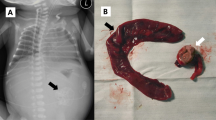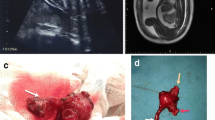Abstract
Meconium peritonitis is a chemical peritonitis usually resulting from antenatal bowel rupture. Prenatal ultrasound findings include ascites, intraabdominal masses, bowel dilatation and the development of intraabdominal calcifications [1–5]. The most common bowel disorders which lead to meconium peritonitis in utero are those resulting in bowel obstruction and perforation, such as small bowel atresias, volvulus and meconium ileus [1–5]. Meconium ileus is associated with cystic fibrosis in most cases, although extraluminal abdominal calcifications are usually scarce in cases of cystic fibrosis [1, 6]. Postnatal outcome for infants with meconium peritonitis depends on the etiology for bowel rupture and underlying disease.
Similar content being viewed by others
References
Foster MA, Nyberg DA, Mahony BS, Mack LA, Marks WM, Raabe RD (1987) Meconium peritonitis: prenatal sonographic findings and their clinical significance. Radiology 165: 661
Blumenthal DH, Rushovich AM, Williams RK, Rochester D (1982) Prenatal sonographic findings of meconium peritonitis with pathologic correlation. J Clin Ultrasound 10: 350
Fleischer AC, Davis RJ, Campbell RT (1983) Sonographic detection of a meconium-containing mass in a fetus: a case report. J Clin Ultrasound 11: 103
Silverbach S (1983) Antental real-time identification of meconium cyst. J Clin Ultrasound 11: 455
Williams J III, Nathan RO, Worthen NJ (1984) Sonographic demonstration of the progression of meconium peritonitis. Obstet Gynecol 64: 822
Berdon WE, Baker DH, Becker J, De Sanctis P (1967) Scrotal masses in healed meconium peritonitis. N Engl J Med 277: 585
Kirkinen P, Jouppila P, Leisti J (1987) Transient fetal ascites and hydrops with a favorable outcome: a report of two cases. J Reprod Med 32: 379
Platt LD, Collea JV, Joseph DM (1978) Transitory fetal ascites: an ultrasound diagnosis. Am J Obstet Gynecol 132: 906
Mueller-Heubach E, Mazer J (1983) Sonographically documented disappearance of fetal ascites. Obstet Gynecol 61: 253
Author information
Authors and Affiliations
Rights and permissions
About this article
Cite this article
Estroff, J.A., Bromley, B. & Benacerraf, B.R. Fetal meconium peritonitis without sequelae. Pediatr Radiol 22, 277–278 (1992). https://doi.org/10.1007/BF02019858
Received:
Accepted:
Issue Date:
DOI: https://doi.org/10.1007/BF02019858




